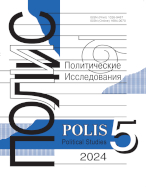The “Funnel of Causality” in Electoral Studies
Meleshkina E.Yu.,
Dr. Sci. (Pol. Sci.), Head of the Department of Political Science, Institute of Scientific Information for Social Sciences, Russian Academy of Sciences
elibrary_id: 192463 |
DOI: 10.17976/jpps/2002.05.05
Meleshkina E.Yu. The “Funnel of Causality” in Electoral Studies . – Polis. Political Studies. 2002. No. 5. https://doi.org/10.17976/jpps/2002.05.05
It is experience of the “funnel of causality” model used in the study of electoral behaviour that the author analyzes in her article. On having discussed in detail the “classical variant” of the “funnel of causality”, proposed in 1960 by A.Campbell and his colleagues in a monograph entitled “American Voter”, as well as its version elaborated by E.Oppenhuis, the author then turns to constructing her own model adapted to Russian conditions. This model, by the author’s recognition, is of a pronouncedly abstract character, and its fruitful employment in the analysis of Russian voters’ behaviour requires, for one thing, adequate operationalization of the factors represented in it and, for another, obtaining of relevant empirical data.
See also:
Grigorieva E.I.,
Once Again on Ethics of Scientific Publications. – Polis. Political Studies. 2016. No5
Linetsky A.I.,
Latent lnstitutions: standard behavior patterns occurred spontaneously and their political meaning. – Polis. Political Studies. 2014. No6
Melkumian K.S.,
Informal Structure in the Center of the Counter-Terrorism Financing Regime: Effectiveness Issues. – Polis. Political Studies. 2019. No2
Round Table of the «Polis» Journal, Smorgunov L.V., , Medushevsky A.N., Yeliseyev S.M., Isayev B.A., Mitrokhina T.N., Baranov N.A., ,
Moisey Ostrogorski and traditions of political science. – Polis. Political Studies. 2011. No4
Melville A.Yu.,
The “Funnel of Causality” Methodology as Intermediary Synthesis of “Structure and Agency” in the Analysis of Democratic Transitions. – Polis. Political Studies. 2002. No5





.jpg)






 print
print
.jpg)
.jpg)